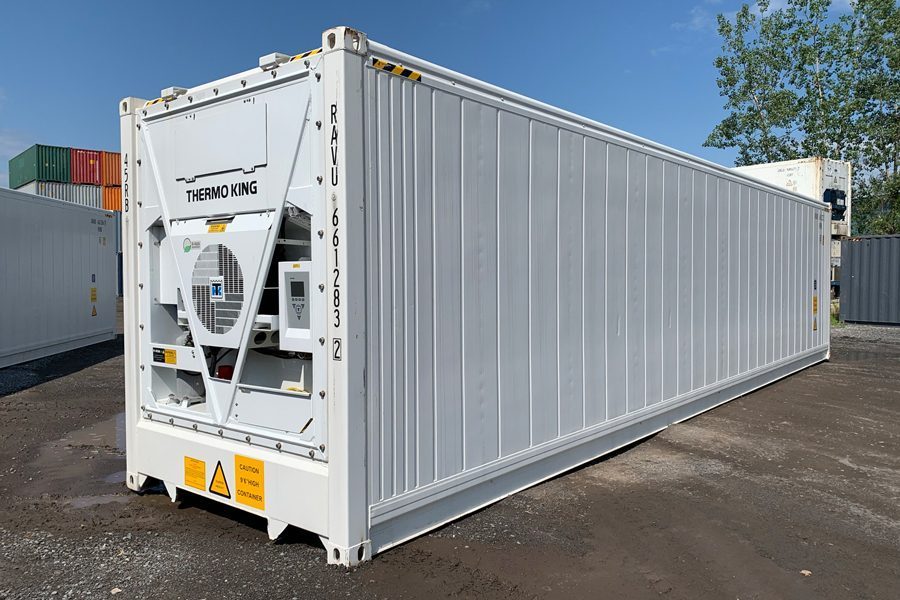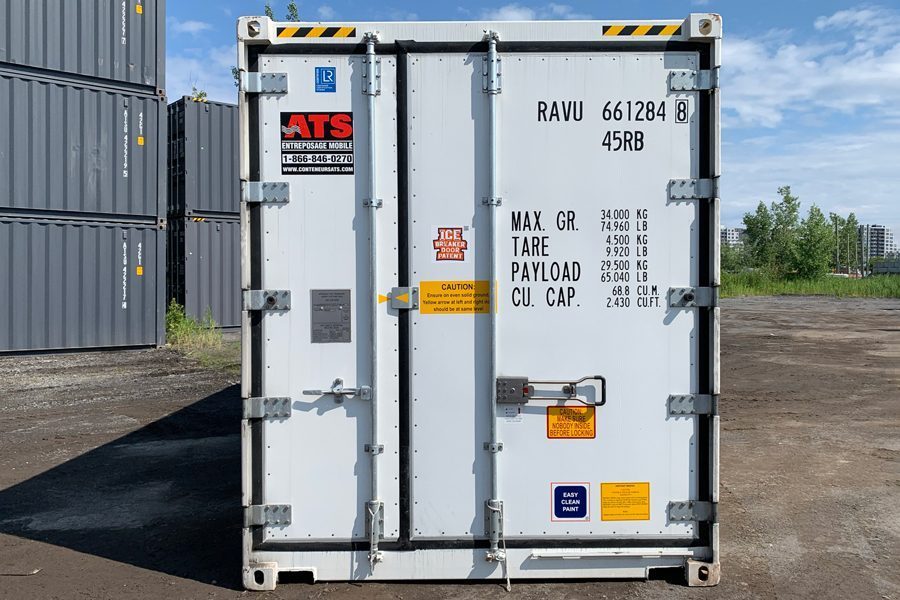Everything About Freezer Containers: Important Insights for Your Storage Space Requirements
Cold store containers play a vital role in the preservation of disposable goods. They can be found in numerous types, including cooled and insulated devices, each developed for particular storage space requirements. Recognizing the benefits and crucial attributes of these containers is important for organizations aiming to enhance their procedures. As the need for reliable storage space options expands, exploring the various alternatives available can result in notified decisions that influence both success and sustainability. What elements should one consider when selecting the appropriate container?
Kinds of Freezer Containers
Cold storage space containers been available in different kinds, each made to meet certain temperature level control needs. Among the most usual kinds are chilled containers, which keep temperature levels in between 0 ° C to 10 ° C, making them appropriate for subject to spoiling products like fruits, veggies, and dairy items. One more kind is the deep freezer container, which operates at temperatures below -18 ° C, ideal for long-term storage of frozen things such as meats and seafood.
Insulated containers provide temperature stability without active cooling, making them useful for temporary transport of temperature-sensitive items. Additionally, there are portable freezer systems, which use flexibility in areas and are usually made use of in events or seasonal procedures. Finally, blast refrigerators quickly minimize the temperature of hot foods, making certain safety and security and top quality. Each kind offers a special objective in different markets, from food service to drugs, stressing the value of choosing the appropriate container for details storage demands.

Advantages of Making Use Of Cold Store Solutions

Moreover, cold store remedies extend the service life of things, reducing waste and raising earnings for companies. By effectively taking care of inventory with proper temperature level control, business can maximize their supply chains and boost functional efficiency.
Furthermore, cold store facilities enable flexible storage choices, suiting different quantity requirements and seasonal variations sought after (used 40ft refrigerated shipping containers). This versatility assists services react rapidly to market modifications
Last but not least, utilizing chilly storage solutions can guarantee compliance with health and wellness laws, guarding both customers and businesses. In general, the critical use cold storage space boosts item monitoring while promoting sustainability and economic feasibility.
Secret Attributes to Look for in Cold Storage Containers
When selecting cool storage containers, a number of vital features quality cautious consideration to protect peak efficiency and dependability. Initially, temperature control capacities are important; containers should keep constant temperatures ideal for details goods. Insulation quality also plays a significant role, as exceptional insulation reduces energy consumption and improves temperature stability.
Next off, ease of access and loading is vital; containers ought to offer straightforward styles for efficient handling and company. Toughness is another essential element; weather-resistant materials assure longevity and secure components against ecological aspects.
Additionally, flexibility attributes, such as built-in wheels or raising factors, facilitate transport, while personalized designs enable tailored storage options.
Last but not least, keeping an eye on systems, consisting of temperature level alarms and remote monitoring, supply real-time updates, ensuring that conditions remain perfect. By concentrating on these functions, individuals can select freezer containers that fulfill their functional demands effectively.
Choosing the Right Freezer Container for Your Needs
Choosing the ideal freezer container requires a thoughtful assessment of details requirements and functional demands. Factors such as the kind of products being kept, temperature sensitivity, and volume ought to be prioritized. For example, disposable food products might demand containers with rigorous temperature level controls, while pharmaceuticals may require precise conditions to maintain efficiency.
Additionally, potential users must consider the container's size and wheelchair. A bigger unit might be essential for bulk storage space, while smaller, portable alternatives could be perfect for on-site or momentary needs. Insulation high quality and energy effectiveness are additionally vital, as these will affect operational expenses and temperature stability.
Conformity with sector guidelines and standards is crucial, particularly in sectors like food and healthcare. By very carefully assessing these elements, customers can choose a cold store container that effectively satisfies their special demands and warranties optimum storage problems.
Finest Practices for Maintaining Freezer Conditions
Preserving perfect cold storage problems is necessary for maintaining the quality and safety of temperature-sensitive products. Consistently checking temperature and moisture degrees is vital; utilizing trusted electronic thermometers and hygrometers can give accurate readings. Appropriate insulation of cool storage space containers aids reduce temperature level changes and power loss.
Carrying out a first-in, first-out (FIFO) system guarantees that older supply is used prior to more recent supply, minimizing waste (used 40ft refrigerated shipping containers). Furthermore, maintaining an arranged design within the storage space enables for better air flow and reduces the danger of cross-contamination
Routine upkeep checks on equipment, such as compressors and seals, are very important to avoid malfunctions. Personnel training on finest techniques for packing and unloading products helps preserve temperature level stability. Ultimately, keeping doors shut as long as feasible limits heat exchange, assuring that the cold store setting continues to be secure and efficient in protecting important items.
Cost Considerations for Freezer Solutions
When assessing chilly storage solutions, it is necessary to take into account the initial financial investment expenses together with recurring functional expenditures. A detailed break down of these costs can expose substantial long-lasting savings possibility for services. Recognizing these monetary elements helps stakeholders make educated choices regarding their cold store requirements.

First Financial Investment Expenses
The financial landscape of freezer containers offers different initial investment costs that companies have to take into consideration. These costs normally consist of the purchase or rental cost of the containers, which can vary based upon type, size, and insulation high quality. Additionally, expenses connected to retrofitting existing structures to accommodate freezer needs to be factored in, particularly if specialized equipment is required. Installment expenses, consisting of electrical work and refrigeration systems, likewise contribute to the total preliminary financial investment. Companies should not overlook transportation prices for supplying containers to their desired place. Prospective website customization choices, such as shelving or temperature level surveillance systems, can even more affect the first financial expense. Mindful budgeting for these variables is crucial for successful freezer application.
Functional Costs Malfunction
Operational expenses for cold store remedies include numerous crucial cost factors to consider that companies have to navigate. Secret variables include energy expenses, which can be significant due to the requirement to keep low temperatures. Upkeep expenses are likewise considerable, as regular maintenance is vital to guarantee devices operates effectively and continues to be compliant with wellness and safety requirements. In addition, labor costs may develop from the demand for specialized staff to keep track of the storage and take care of environment. Insurance expenditures are one more factor to consider, as companies need to secure their financial investments against possible losses. Finally, any kind of possible regulatory compliance expenses have to be factored in, as companies might need to invest in systems that stick to food safety and ecological policies. Understanding these costs is important for reliable budgeting.
Long-Term Cost Savings Potential
Buying cool storage services offers considerable long-term financial savings potential, transforming first expenditures right into financial efficiency over time. By reducing wasting and waste, companies can improve their earnings margins substantially. Advanced insulation and energy-efficient systems lower utility prices, which collect over the life expectancy of the tools. In addition, cold store containers usually need much less regular maintenance compared to traditional refrigeration approaches, resulting in reduced repair work expenditures. The capacity to store items for extended periods without endangering quality permits companies to maximize market changes, maximizing revenue. In addition, the scalability of freezer solutions allows firms to adapt to altering needs without sustaining excessive expenses. On the whole, these aspects add to an engaging case for cool storage space as a cost-effective financial investment technique.
Often Asked Concerns
Exactly How Lengthy Can Food Be Saved in Cold Storage Space Containers?
The period food can be stored in cold store containers varies by type. Normally, subject to spoiling items last from days to weeks, while frozen foods can remain risk-free for months, depending upon proper temperature level and storage conditions.
Are Freezer Containers Energy-Efficient?
The energy effectiveness of chilly storage containers varies based on style and insulation high quality. Modern systems usually make use of advanced technology to minimize energy intake, inevitably adding to lowered functional prices and ecological influence in lasting usage.
Can Freezer Containers Be Personalized for Particular Needs?
Cold storage containers can indeed be tailored to satisfy certain demands. Adjustments may include temperature controls, size modifications, and additional features, allowing customers to customize options effectively for various storage space needs and functional preferences.
What Are the Common Dimensions of Cold Storage Containers?
Freezer containers normally are available in conventional sizes such as 10, 20, and 40 feet. These measurements suit numerous storage demands, guaranteeing flexibility for services needing temperature-controlled settings for disposable items or delicate materials.
Do Cold Store Containers Require Unique Authorizations for Usage?
Cold store containers often call for special authorizations for use, depending on regional laws and intended applications. Authorities may mandate authorizations to ensure safety requirements, environmental conformity, and proper functional techniques are preserved during their use.
Cold storage space containers come in different kinds, each developed to fulfill particular temperature level control requirements. Furthermore, cool storage centers permit for flexible storage space options, accommodating different quantity needs and seasonal changes in need. Picking the ideal cold storage space container calls for a thoughtful assessment of functional needs and certain demands. The financial landscape of chilly storage space containers offers different preliminary financial investment prices that companies should take into consideration. Cold storage space containers can undoubtedly be customized to satisfy certain demands.